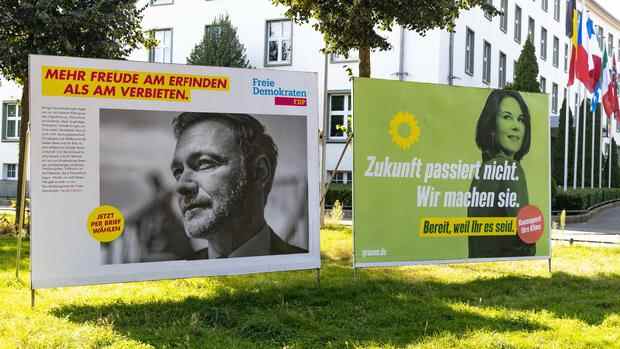The FDP stands for economy, the Greens for climate protection and Armin Laschet, unlike Angela Merkel, for a modern version of Rhenish capitalism. Germany would do well with that.
Gerhard Schröder has a good nose for politics. The former SPD chancellor thinks very highly of Armin Laschet. Many underestimate the Union candidate for chancellor, the comrade of the bosses does not do that. He considers the fact that Laschet can combine industrial policy with the social as a great strength. The only constellation in which Laschet can still become chancellor is an alliance with the Greens and the FDP. That would be the best way to do Germany.
The FDP brings economic policy sense, the green core competence consists of climate protection and Laschet, unlike Angela Merkel, stands for a modern version of Rhenish capitalism. During his reign in North Rhine-Westphalia, he initiated important economic projects. Be it with de-bureaucratisation and digitization. NRW has its own digital ministry. That could also be a blueprint for the federal government. Digitization enables smart climate protection.
Top jobs of the day
Find the best jobs now and
be notified by email.
The Green Chancellor candidate Annalena Baerbock is politically very closely linked to SPD Chancellor candidate Olaf Scholz. But in the SPD there are increasing votes for a left alliance. Ex-Juso boss Kevin Kühnert collects the troops for a member survey. The clear goal is red-red-green.
This is extremely dangerous for the bourgeois Greens. They want a better environment for their children, but not socialist experiments. Robert Habeck, the strong man in the Greens, knows that, and Prime Minister Winfried Kretschmann from the automotive state of Baden-Württemberg knows it too. The latter has an important say when it comes to the coalition in the federal government. In Stuttgart he preferred an alliance with the CDU to the traffic light coalition. He knew what he had.
A breath of fresh air in government
Jamaica stands for economic growth and jobs. It does not stand for redistribution, through massive tax increases and a wealth tax. Such a coalition would counter the shortage of skilled workers through better education policy and an interest-based immigration policy.
The issue of internal security would be in the usual good hands with the Union. Even the Greens are now calling for more and better equipped police officers. A Federal Finance Minister Christian Lindner would certainly ensure solid finances in Germany, but also in Europe.
There would be no debt union. This is also important in the fight against currency depreciation. It is true that the ECB does monetary policy, but economic, financial and labor market policy is in the hands of a federal government.
Massive spending programs such as those planned by a left-wing alliance are the biggest drivers of inflation. You just have to look in Biden’s USA. Jamaica brings a breath of fresh air to government. Olaf Scholz has promised to keep going.
Pro traffic lights: SPD, FDP and Greens promise stability
In a traffic light alliance, the SPD and the Greens would have to go far towards the desired partner FDP. In the case of Jamaica, on the other hand, the liberal positions would come under the wheels.
by Christian Rickens
At first glance, the matter seems pretty clear: In a Jamaica coalition, there are two parties, the Union and the FDP, which at least ostensibly represent business-friendly policies in their election manifestos. Only one in a traffic light. So a coalition of the Union, the FDP and the Greens is better for the economy than one made up of the SPD, the Greens and the FDP. Understood?
No, because this simple calculation ignores the internal party position of the respective candidate for chancellor as well as the rules of coalition arithmetic. In the negotiations on a Jamaica coalition, the scenario of 2017 would repeat itself: The Greens would have to advertise with concessions and posts so that they do not form a coalition with their preferred partner, the SPD (and possibly the Left Party).
The FDP would once again be perceived as the partner that the Union naturally priced in – and whose positions in the coalition agreement can be sledged accordingly. With the crucial difference that FDP boss Christian Lindner cannot afford to get up from the negotiating table again.
So it is very possible that the FDP will get more business-friendly positions at a traffic light than in Jamaica. There should be nothing left of the dangerous red-green plans for a wealth tax in a traffic light. In climate policy, in the best case scenario, the urge of the Greens to resolutely push ahead with decarbonization would be combined with the clever market-based instruments that the FDP has provided for this.
Olaf Scholz stands for a stable government
In a Jamaica alliance, on the other hand, the black and green fans of industrial policy would come together, who would prefer to adopt a decarbonization plan for every Haribo snail, including the corresponding subsidies. Modern market economy works differently.
In addition, even if Armin Laschet saved himself across the finish line on Sunday with a respectable result, as Federal Chancellor he would be chased by the opponents in his party from day one. First of all from CSU boss Markus Söder, who already considers himself the better chancellor.
Scholz, on the other hand, would move into the Chancellery with the huge internal party bonus of the surprising election winner. There is currently no one in his party who could dispute his office. Even a Kevin Kühnert needs a few more years to get started.
From the economic point of view, a good government is first and foremost a stable government. Olaf Scholz is most likely to promise that. The country cannot afford a wobbly chancellor.
More: Angela Merkel’s economic balance sheet in 16 graphics
